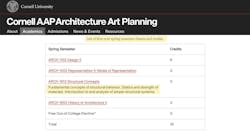If you ever thought about being an architect but thought you couldn’t handle the math, you aren’t alone. At parties across the land, as soon as someone finds out there is an architect in the crowd, there is a story being told about how they wanted to be an architect but since they couldn’t draw or weren’t very good at math they decided to do something else.
So, when we were coming up with topics for the 2019 editorial calendar for the Life of an Architect podcast, I put “Architects + Math” on the list because it is one of the most-searched topics on my site. Here are some Life of an Architect website insider tidbits for you … are you interested? Of course you are.
As of this recording, I have written 923 articles on this site, one of which was specifically related to math and being an architect. Out of those 923 articles, the one on architect’s and math is the 28th most read article with 306,865 views. If you take away only one thing from that piece of information, it at least tells you that there are some questions surrounding the role of math when it comes to architecture.
Whenever I’ve written on the subject of math as it relates to being an architect, it was always prompted by emails I received that all ask the same question:
“Do I have to be good at Math to be an Architect?”
The answer to that question is a definitive … not really.
What Sort of Math do you need? [8:40 mark]
There are times when I write things on this site that are categorically embarrassing to me … I would really rather that people not know everything about my past, especially when it is something that I feel somewhat ashamed of – but for the greater good, I think they are important to share. When I was in school, there was a much heavier level of math-related courses that were specific to the engineering side of architectural practice.
What’s crazy about that is that not only am I mediocre at math, I made it out of high school with Algebra II as the most advanced math that I studied. These structures classes, as well as the 2 semesters of real physics I had to take, were brutally hard for me. I didn’t know trig and knowing that base of information was a foregone conclusion.
Architecture School Math Curriculum? [14:54 mark]
Curriculum, which is really a fancy word for “classes”, should be a really good place to take a look to see how structural courses are viewed in a modern day architectural education. When I went looking for sample curriculums from a myriad of architectural programs, I quickly became frustrated since apparently architectural schools want this information to remain top-secret and go out of their way to keep this information hidden to those of us without Ph.D. level internet sleuthing skills. For this part of our conversation, I looked at the course work from several Division 1 architectural schools. What is readily apparent is that the amount of math required varies wildly between programs.
I say wildly.
So How do Most Architects use Math? [28:24 mark]
For me, it comes in during the detailing phase of the project – and is mostly addition and subtraction. It’s about getting materials alignments to fall into place, openings to fall along masonry dimensions, dividing my windows into patterns that work with the allowable span of certain structural requirements and where I need to supplement with columns. I use simple math every day to some extent, but none of it is magic and absolutely none of it requires trigonometry, calculus or physics. My father used to tell me, and now I am telling you, that you go to college to learn how to learn. This is an important state of mind because learning things that are hard and challenging forces you to push yourself and develop skill sets that might be of peripheral value to you.
While it’s possible that there are other architectural jobs out there that require an insane ability to process high-level math problems, I’ve never discovered them. I asked a handful of my architect buddies from around the country prior to recording today’s episode and asked them how important they felt a strong background in math would be to someone ultimately finding success as an architect.
Want to guess what the general sentiment was from literally every single person?
Not one single architect that I asked felt that math should be the rate-limiting step if your dream is to become an architect. It’s okay if you struggle with math, just persevere and do what needs to be done and you can look back over your shoulder at hard math for the rest of your long and illustrious career as an architect.
Hypothetical [43:20 mark]
Today’s hypothetical is a little bit darker in nature than the typical scenarios we’ve been discussing, but surprisingly, there is a lot more to this particular question than would appear after a casual first glance.
"If you could know either the day in which you die, or the manner in which you die, which one would you pick?"
I’m not entirely sure but at least in the beginning, and possibly for the first time since we started doing hypothetical questions at the end of every episode, Andrew and I agreed with the answer that we chose. I tend to think that most people will choose the same answer we did but there have been a few people I have since asked this question of who went a different path … and we almost beat each other up over the disagreement.
Now that I am 20+4 years removed from structures classes, I can safely say that 99% of all the math I do day in and day out involves the same sort of stuff my daughter is mastering in the 5th grade. Addition, subtraction, multiplication and division, that’s about it. It isn’t the complexity of the math that’s the challenge, it’s identifying what you are trying to solve for in the first place
Cheers,
Many thanks to Centria for their support of today’s episode. For more information, please visit www.centria.com/lifeofanarchitect.




